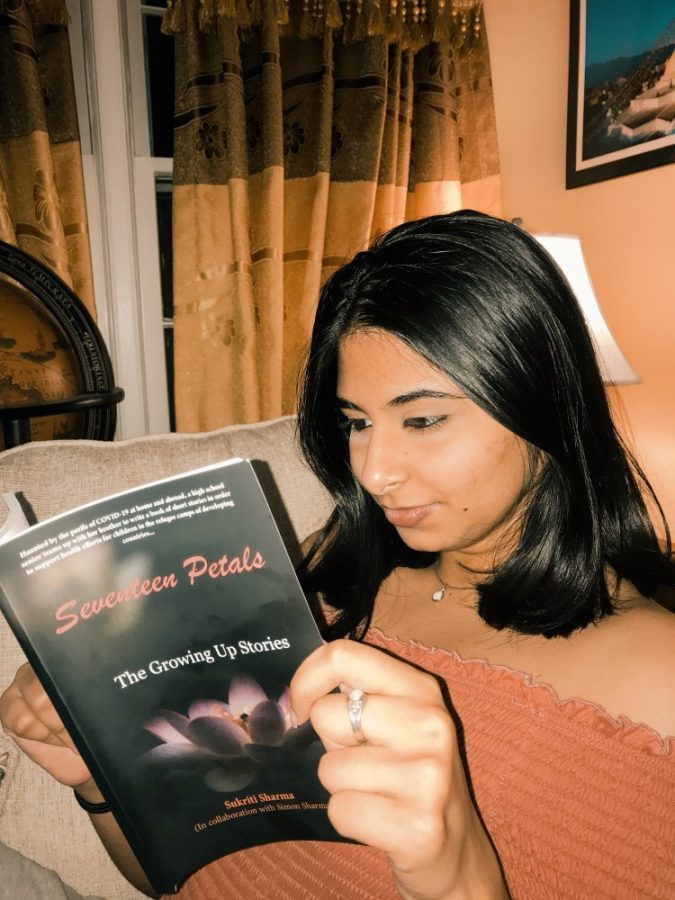Senior writes book to raise money for refugee camps
Photo courtesy of Sukriti Sharma
Senior Sukriti Sharma reads her book “17 Petals: The Growing Up Stories” that she wrote mostly during her junior year and self-published through Amazon over quarantine.
October 23, 2020
Being a high school student brings difficulties of its own, but these years also offer us lessons from the new experiences we face in life—lessons senior Sukriti Sharma learned and wrote down in her book “17 Petals: The Growing Up Stories.”
What began as personal writings became a large-scale quarantine project. Sharma was encouraged to publish her collection of personal stories after sharing them with her father, who was deployed in the Middle East at the time. With the break from school, she was able to fully immerse herself in the creative process, working long hours with her father, who had since returned, to self-publish the stories that had taken her a year to write.
“I think anyone who is familiar with the writing process can agree when I say you experience a good amount of writer’s block when going through multiple drafts,” said Sharma. “Ideas get pushed around, frustration starts to rise, and the beginning stages of quitting [start] to present [themselves].”
Sharma, originally writing the stories to look back on later for her own self reflection, designed each chapter around lessons she has learned as a teenager, applying fundamental teachings she has been taught by her family and experiences.
“One of the first lessons my parents instilled in me was maintaining the discipline of telling the truth, and even more importantly, learning how to forgive others,” said Sharma. “That is why the first chapter of the book discusses forgiveness and developing the ability to realize your mistakes. The second chapter features a story on truth and the power a guilty conscience has on a person.”
The stories, though, are more about the lessons they teach rather than Sharma’s own life. Although influenced by her life, she did not want to make herself the main character in her book. Hence, every story is written in the third person with the exception of two. Additionally, there is one story in particular that Sharma modeled after her younger brother, who offered his unique perspective on Sharma’s work.
“I did not want my personal thoughts and emotions to get in the way of the reader’s interpretation of the story and wanted them to come to their own conclusions as they see fit. I did not want my possible bias [to] hinder them from understanding the true meaning behind each story,” said Sharma.
Although writing and publishing the book was a more recent goal of Sharma’s, the ideas and influence behind its foundations began before its fruition. During a three month visit to Nepal in 2018, Sharma was able to visit a Tibetan refugee camp in Pokhara that impacted her world perspective and provided her with motivation to help people like those she had met.
“My heart broke after witnessing the living conditions the refugees were met with,” said Sharma. “They were stripped of the most basic necessities many of us take for granted such as proper shelter, adequate food, clean water, and reliable electricity, and I wondered how anyone could be expected to live in a place where they didn’t have access to proper medical care. This was a huge reality check, and I immediately recognized my privilege compared to those who were forced to seek refuge in war torn countries.”
Thus, Sharma’s book took on a new purpose. Although initially being doubtful that anyone would want to read a book written by a seventeen year old, she was inspired by all she had witnessed in Nepal and decided to continue with her work by donating 100% of the profit to the Tibetan refugee camp she had visited there and a camp in Palestine after reaching out to senior Nawal Sarsour who shared a similar interest in aiding refugees. In light of Covid-19, Sharma is especially concerned about the sanitary conditions and medical aid offered in the camps and hopes the proceeds from her book might help towards building clinics there. In the future, she wants to enhance her service by pursuing a career as a surgeon, helping to establish hospitals in developing countries where people may not be able to afford medical treatment.
Sharma’s efforts as well as the motives behind them are testament to the change one person can offer the world, regardless of age. She proves that someone can make the best of a situation and even extend those benefits to others beyond it with enough will and determination.
“It felt like a never-ending cycle of frustrations, anger, and defeat, but I genuinely mean it when I say it was worth it in the end, because I can look at it and proudly say that I was responsible for every single aspect of that book,” said Sharma.





